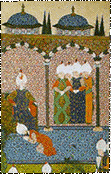|

| |
1
OF 8 |
 |
 Egypt
was evacuated on 2nd September 1801 and under the First Consul France
hastened to restore diplomatic relations with the Porte. The hegemony
of Selim III over Egypt was acknowledged under the condition that
the English should not be allowed into the country (the Preliminary
Peace of Paris, October 1801). In the following year these terms
were confirmed in the Treaty of Amiens (27th March 1802), which
was not signed by the Porte itself. Then Napoleon sent the young
General Sebastiani to Constantinople under orders to negotiate a
new, separate alliance. Sebastiani was so successful in fulfilling
his mission that the Russians objected. They countered with the
Serbian Declaration of Independence (1803), which they supported.
War with Russia seemed inevitable. Egypt
was evacuated on 2nd September 1801 and under the First Consul France
hastened to restore diplomatic relations with the Porte. The hegemony
of Selim III over Egypt was acknowledged under the condition that
the English should not be allowed into the country (the Preliminary
Peace of Paris, October 1801). In the following year these terms
were confirmed in the Treaty of Amiens (27th March 1802), which
was not signed by the Porte itself. Then Napoleon sent the young
General Sebastiani to Constantinople under orders to negotiate a
new, separate alliance. Sebastiani was so successful in fulfilling
his mission that the Russians objected. They countered with the
Serbian Declaration of Independence (1803), which they supported.
War with Russia seemed inevitable.
The implications of the decline of Ottoman power,
the vulnerability and attractiveness of the empire's vast holdings,
the stirrings of nationalism among its subject people, and the periodic
crises resulting from these and other factors became collectively
known to European diplomats in the nineteenth century as "the
Eastern Question." In 1853 Tsar Nicholas I of Russia described
the Ottoman Empire as "the sick man of Europe." The problem
from the viewpoint of European diplomacy was how to dispose of the
empire in such a manner that no one power would gain an advantage
at the expense of the others and upset the political balance of
Europe.
European historians tend to present Ottoman
decline solely from the perspective of the wars with Europe. While
these wars were significant, Ottoman decline was more pronounced
internally and economically in the eighteenth century. There are
two overwhelming aspects of this decline: meteoric population increase
and the refusal to modernize.
| |
1
OF 8 |
 |
|


